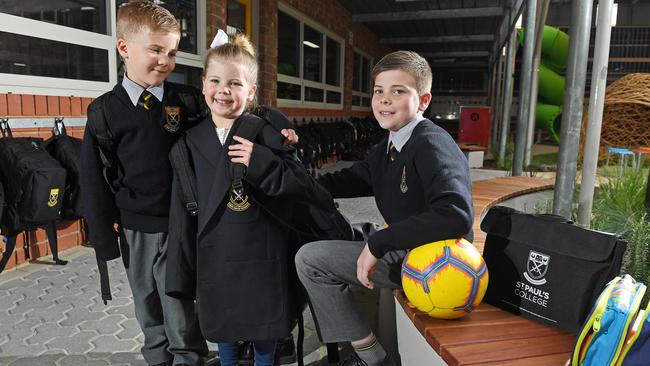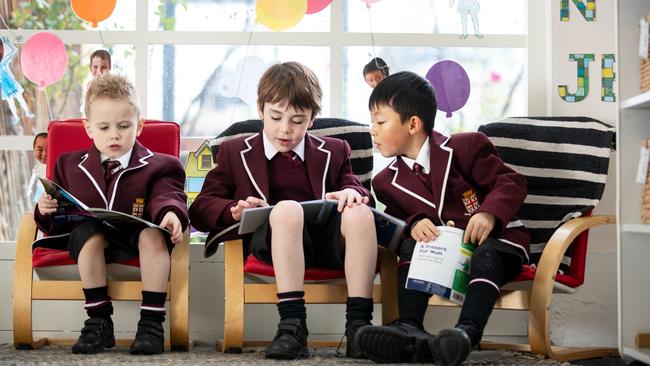Single-sex vs co-ed: Adelaide’s top educators debate the advantages of each as another all-boys school elects to enrol girls
There are just six all-boys schools remaining in SA – and one has just announced it will switch to co-ed. Do single-sex schools still have a place in 2020? Our state’s top educators have their say.

- Positives and negatives of Gen Alpha revealed by parents, teachers
- The things that matter most for parents in 2020?
As parents, everyone wants the best for their kids and to give them the opportunities to help them succeed at work – and in life.
When it comes to choosing schools there is plenty to consider – public or independent, big or small, sporty or academic?
But what difference does it make if the cohort of kids is all the same gender? Is gender even a thing to consider in 2020 and how will these classroom interactions help shape the type of young adult your child becomes?
After St Paul’s College announced last week it would switch to co-education from 2022, the Sunday Mail speaks to a host of passionate, experienced educators about the pros and cons of single-sex over co-ed and vice versa.
While there are some fascinating insights into the benefits of each and hearty debate over academic success versus emotional intelligence, one thing is clear from each of the experts we speak to: all kids are different and what suits one child, may not suit the next, regardless if they are a boy or girl.
Professor in Education at UniSA Judith Gill said the trend away from single-sex education reflected a growing preference for a co-educational experience that better reflected the world beyond school.
“This trend into co-education has been happening for quite a few years and is, perhaps, the most common and significant move happening in Australian schools in most places,” Prof Gill said.

Australian Curriculum, Assessment and Reporting Authority data shows that of SA’s 276,418 school students in 2019, just 13,780 – 8002 girls and 5778 boys – were enrolled at single-sex schools.
Prof Gill said that in all states but NSW, which has a strong tradition of high-performing single-sex schools across both the public and private sector, the lean to co-education was evident.
“(Schools) can’t offer the range of subjects that young people want to study unless they are a certain size, so there is an economic argument there,” she said.
“There is an educational (driver) as well, in that co-ed presents students with different opinions, different points of view.
“But the most compelling thing is, if we say the work of schools is to produce young people who are fully prepared to participate equally in our wonderful multicultural, diverse, inclusive society, their schooling shouldn’t be organised around differences.”
However, veteran Adelaide educator and principal of girls-only Seymour College Kevin Tutt, who spent 20 years in the co-ed space ahead of 16 years as headmaster at boys-only Prince Alfred College, argues there are many benefits to a single-sex education, particularly for girls.
“Girls and boys are wired differently … (they develop differently) physically, emotionally and socially, and single-sex schools can cater for those differences,” he said.
“Increasingly, the child helps to make that decision and it is all about fit in respect to culture and programs – but choice is critical and I would not want to see that choice … disappear.”
What’s to love about co-ed?
For Mercedes College principal Andrew Balkwill, co-education at his R-12 school makes perfect sense in the context of the modern world.
“It supports and reflects the diversity of our culture, it promotes inclusiveness and social interaction (and helps to) develop relationships that celebrate equality and mutual respect,” he said.
“From a child development point of view, it speaks to things such as resilience, working in collaboration with others no matter what their point of difference might be – gender, race or otherwise.
“Co-education creates diverse experiences in teaching and learning to prepare students for life beyond school as global citizens.”
Mr Balkwill, who has previously presided over a single-sex school, says the needs of boys and girls can be equally met in the co-ed space.
“Even in a single-sex school there are differences between students, we are human, after all – we all have our own strengths and areas for growth,” he said.
He says for his school, a sense of family, community and friendship is key.
“We’ve just had our Year 8/9 girls participate in a knockout Aussie rules football competition … the celebration that came from all students, boys and girls, for those girls out there was just brilliant to see – there was none of that, ‘girls shouldn’t be doing that’,” he said.
At Westminster School, principal Simon Shepherd is a proud and vocal advocate for co-education.
“What I am going to say, is going to sound a bit corny – and a bit like (satirical character) Ali G – but co-education keeps life real,” Mr Shepherd said.
“Because, life is co-ed and as kids go out into the workforce and into life they are going to be working with the opposite gender and they need to be able to have fraternal, positive, engaging and meaningful relationships with each other.”
Mr Shepherd, who has also taught in single-sex settings, believes boys and girls learn valuable lessons from each other in the classroom.
“It allows the boys to look at the girls and learn vicariously through their interactions with them, how to behave in a more emotionally-intelligent and mature manner,” he said.
“Boys teach the girls to set their attributions more appropriately, so instead of girls beating themselves up for not being perfect with a project, which they can do, they learn to think ‘this is OK’.
“And girls do the same things for boys, because if boys go through life attributing everything externally and nothing internally, they end up not being very nice young men.
“The girls learn, through the boys, how to get over things differently, and to move forward – if you tell a boy off in one lesson, he’ll likely get over it quickly and come to the next lesson happy but if you tell a girl off, three weeks later she might still be frowning at you.”
But what of claims single-sex schools perform better academically?
“My challenge to that is, how do they go with their emotional intelligence, success later in life, wellbeing and happiness in relationships?”
Scotch College’s principal John Newton, says education should “advance the abilities of students on every level for the good of the individual and the world around them”.
“I believe co-ed is right for my school because we are an evolving species,” Dr Newton said.
“The most advanced societies increasingly advocate the need for diverse leadership and influence … living and working with people who are different from ourselves is one of society’s constant challenges.
“My wife and I, as single-sex educated parents, are very proud and impressed with the way our two boys and two girls have benefited from co-education ... it has made them broad-minded learners with far more advanced social and intellectual skills than we ever had.”
Pembroke School principal Luke Thomson says co-education “broadens perspectives”.
“If there are demonstrable differences in how boys and girls and gender neutral or diverse students see and contribute to the world, then the power of co-educational schooling is that it offers the opportunity to respond to those experiences every day,” he said.
“If there are embedded gender stereotypes to be challenged, they are challenged every day.”

The benefit of a single-sex education
Prince Alfred College headmaster Bradley Fenner is without question one of this state’s most passionate and vocal voices when it comes to educating boys.
“I think there are certain aspects of our education today that cater very well for girls … to be in a classroom with a group of girls who are, on average, more mature, more focused on their work, often more articulate and better able to express themselves, can leave boys feeling as though they can’t compete,” he said.
“I think they can benefit from having a school, system, structures and processes that are focused very much on them and their needs.”
Mr Fenner, part of a SACE gender reference group, says there’s evidence around the world to show girls are performing better at school than boys.
“Girls are 50 per cent more likely to get an A, boys are twice as likely to get a D or an E in SACE … I think there are some aspects of our education system which are really selling boys short,” Mr Fenner said.
How does he counter criticism students in his system might not regard women as equals?
“In a boys-only environment, we can keep talking about these issues and keep dealing with them in a very targeted way,” he said.
“We’ve the opportunity to do some things that are focused very much on the male experience and what it means to be a man in the modern world – what does responsible, thoughtful masculinity look like in this day and age?”
Mr Fenner says single-sex schools are an important part of the tapestry of school type in Adelaide.
“I strongly believe there is a place for boys-only schools, the research has shown that … we now only have five boys schools remaining in Adelaide at secondary level and I think each of these has its place, if only to provide an alternative,” he said.

At all-girls Walford Anglican School For Girls, principal Rebecca Clarke agrees choice is vital.
“Here in Adelaide we are blessed for choice and families can choose the school that is right for their child … we have siblings of girls here who are at a range of schools, boys’ schools, co-ed schools, local government schools,” she said.
But she says her school’s focus is “wholly and unapologetically on the needs of girls”.
“We are equipping girls with the skills and the mindset, attitudes, confidence and self-belief in their own abilities to thrive not only in school but outside of school as well,” she said.
“We want to get girls into boardrooms, into leadership positions, into government.
“What I see is confident young women who are ready to take their place wherever that may be with confidence and self-assuredness.”
For Julia Shea, principal of St Peter’s Girls’ School, the results speak for themselves.
“A plethora of research from around the world, including Australia, shows that girls in single-sex schools perform better academically,” she said.
“They also enjoy many social and emotional benefits such as improved self-esteem, a greater sense of wellbeing and decreased social anxiety.
“Girls are empowered to defy gender stereotypes … they’re far less risk averse and more open to entering a competitive environment – important precursors to leadership development.”

